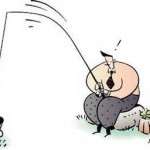Can ignorance be cause for hope? Can ignorance, to paraphrase, deliver society into a state of bliss? Perhaps not bliss, but an argument can be made for progress. About a month ago a noose was found hanging from a tree on the campus of Duke University in North Carolina. To those of us who grew up in the 20th century, a noose on a tree is about as subtle a sign of racism as a burning cross. The specter of the vilest form of collectivism, racism, had apparently poked its head from the cesspool of ideas. There were immediate protests from students, the community and the university administration. They were determined to let those who harbor such beliefs know they are not welcome at Duke or in society at large. To those who have said “nothing has changed” in this country regarding attitudes toward race and racism, I believe this response (among many) if not outright disproves that position, it certainly is an embarrassing incongruity with that narrative.
As it turns out, thankfully, there was no clandestine reemergence of the KKK or anything similar. This week it was revealed that a Duke University undergraduate student was the unwitting culprit. He was entirely unaware of the cultural and historical significance of those two objects juxtaposed against each other. Perhaps they don’t teach much history these days in high school. Perhaps he just wasn’t a very good student (although he got into Duke so he can’t be that much of academic slouch). In a letter to the Duke community he professed that his pun-rich humorous intent was to take a few selfies with the noose and text the images to his friends, suggesting they come “hang out” with him on the beautiful spring day. He then carelessly left it hanging there and went home, blissfully unaware of the firestorm that was about to erupt.
While on one hand we might lament the sheer ignorance of history demonstrated here, I think perhaps there is a silver lining: the sheer ignorance of history. It has often been said by those that have been harmed by someone that they did not know peace until they had truly forgiven their transgressor. Once that was done, they say, it was like an enormous weight was lifted from their soul. They could move on and live their lives. Society must do the same. Although society itself is an abstraction and thus can’t “forgive” anyone, it is capable of collectively forgetting – or not forgetting As long as the memories of old conflicts are passed from the old to the young like an infection, then it becomes impossible to cure the disease. We must forget to be truly free of the sins of our fathers, otherwise like an old scab picked too hard, fresh blood will flow.
This young man’s ignorance may be a hopeful sign that The Open Generation is here. The Open Generation will be blissfully unaware of the racist and sexist anachronistic attitudes of the past and will simply treat everyone the same, not because they’ve been taught that is the proper thing, but because it would not even occur to them to do otherwise. That’s not to say it will be utopia. People will still be jerks to each other, it just won’t be because of their race or sex.
His ignorance is evidence of an upbringing in an environment free of racist ideas or overtones. I myself was also raised in such an environment. Sometimes ignorance is bliss, but sometimes it causes you to lose at a game of charades. During my college days a friend of mine (who was black) became exasperatedly dumbfounded during a game of charades when he learned I had no idea “spade” was a disparaging term for a black person. He mistakenly assumed that because I was white I must be aware of such things. Sorry. I just had never heard such a thing.
As Morgan Freeman said in a 60 Minutes interview (to paraphrase), it is only when we stop talking about race and racism that it will it go away. Race is entirely irrelevant when it comes to interacting with others. Talking about it and highlighting it only serves to keep that distinguishing characteristics active in ones mind. It’s like the old mind-trick, “Don’t think about apples.” So what are you thinking about right now?









